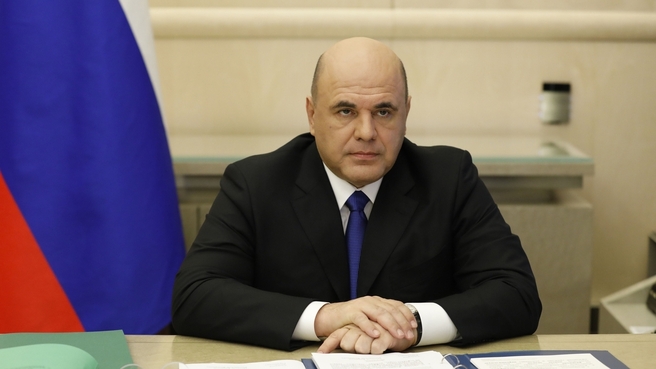Agenda: draft federal laws and budgetary allocations.
Mikhail Mishustin’s opening remarks:
Government meeting
Good afternoon, colleagues,
Of course, yesterday’s vote on amendments to the Constitution, which reaffirmed the society’s support of the course for the development of Russia offered by the President, sets new tasks in all the spheres of Russia’s development and makes each of us even more responsible for their section of work. I would like to ask you to take note of this.
Before getting down to our agenda, I would like to touch upon the Presidential payments for children. Yesterday we started to make lump sum payments of 10,000 roubles for families with children under the age of 16. Parents of 28 million children can receive such benefits. The families that applied for the first payment will soon receive it without additional applications.
Today, at the Government meeting, we will discuss the allocation of almost 7.5 billion roubles for July presidential payments for doctors, medium-link and junior medical personnel and ambulance drivers who are in direct contact with patients with the coronavirus. Last week, in line with the President’s instruction, we prolonged them for two more months: July and August.
We also prolong payments for social workers for two months. Today we will allocate over 3.5 billion roubles for employees of social hospitals who work with patients with the coronavirus and people at risk. The total budget for these purposes will exceed 11 billion roubles.
We will also discuss the support of the unemployed and people on the edge of being let go of. This topic we already discussed in detail during the meeting on the developments on the labour market I held on Monday. Today the Government will allocate over 4 billion roubles to create temporary jobs. This money will be allocated to the regions to partly compensate their expenses on salaries. People who applied to labour exchanges, as well as the unemployed, will be offered jobs in construction, agriculture or transport, housing and public utilities, urban beautification and in social services for older citizens. Moreover, it will be possible to organise additional temporary jobs at enterprises where employees were transferred to part-time jobs. Such measures will allow temporary work for more than 80,000.
We will also discuss the amendments to legislation making it possible to set aside additional resources for combating the coronavirus infection and supporting the economy. The bill calls for amending some provisions of the Budget Code.
It will become possible to exceed approved federal budget expenditures by 1.8 trillion roubles. Additionally, a provision on transferring revenues, derived from managing the National Wealth Fund’s assets, into the federal budget will remain valid until 2024. Decisions for strengthening regional budgets in 2020 are also stipulated, including fines for violating traffic regulations as regards vans and heavy goods vehicles.
Another bill aims to establish an integral system of state support for innovation. It is important to reduce the risks of unjustified criminal prosecution for those engaged in innovative activities. The President has issued the relevant instructions.
With this in mind, we will approve State Duma amendments to the second reading of a bill aiming to modify the Law on Science and State Policy in Science and Technology.
Amendments include efforts to define provisions for gauging the efficiency of using state support. First of all, this implies budgetary funding, allocated for implementing high-risk technological and innovative projects.
A mandatory demand to guarantee the efficiency of investment portfolios is stipulated if budgetary funding is allocated to an innovative development institution by contributing to its statutory capital.
Legislative amendments facilitating greater demand for Russian goods are another important matter. Participants in a meeting, chaired by the President, recently discussed the need to prioritise Russian goods. This implies purchases by companies and corporations with state capital.
Clients will be required to include information about the country of the goods’ origin in various contracts. This will help promote Russian-made goods during purchases, including under import substitution projects and during the implementation of national projects.
And, of course, this will create favourable conditions for Russian businesses and also for expanding their output.












